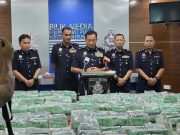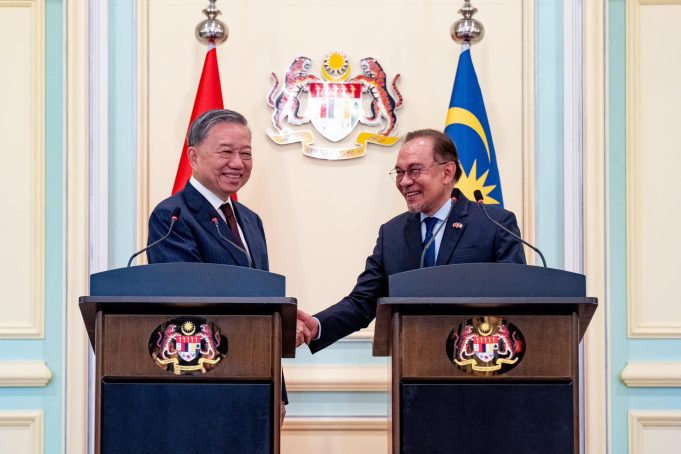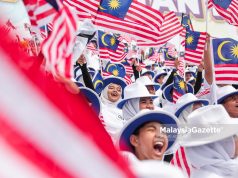THE official visit by His Excellency To Lam, General Secretary of the Central Committee of the Communist Party of Vietnam to Malaysia creates a new chapter of Hanoi-Kuala Lumpur ties that has been rooted in historical friendship and strategic interdependence.
This is Lam’s first visit to Malaysia since being elected as head of the Communist Party of Vietnam in August this year, and the significance of the visit is further bolstered considering that the last time Malaysia received a visit from the General Secretary of the Communist Party of Vietnam was in March 1994, a year before Vietnam’s formal accession to ASEAN.
The General Secretary outlined the key pillars of this new partnership, which include strengthening political trust and cooperation, particularly in defence and security, and this heralds a new chapter in strengthening political trust, and deepening synergy and partnership in areas of high politics.
As Lam emphasised the need for strategic collaboration in upholding international law and contributing to regional peace, development, and prosperity, this mutual commitment elevates the combined strength and advantage in working closely together in facing common challenges in the future.
The elevation to Comprehensive Strategic Partnership underscores the role of various critical sectors that benefit both nations, including green and digital economy, science and technology, new energy transition, high technology advancement,human resources development and people to people relations.
Vietnam’s support for Malaysia’s role and upcoming role as the ASEAN Chair will see greater cohesion and support for promoting regional peace and stability while upholding the sanctity of international law and the rules-based order. Bilateral ties have been underpinned by the common strength and prospect of economic interdependence, especially on critical resources and technologies.
Both are looking to bolster resilience and reliability in supply chain, food security, defence assurances and critical technologies of the future including semiconductor and Artificial Intelligence.
It is a testament to the enduring friendship between our nations and reflects the shared commitment we hold in advancing greater partnerships for global prosperity.
In the focus on developing human capital and people to people advancement, Lam spoke about the broader regional context, where education and training are essential drivers and foundations that enable ASEAN and its member states to thrive in an unpredictable world.
Higher economic and trade ties will bring long lasting returns to both nations, as both face common geopolitical and global economic risks.
Vietnam is emerging as one of the fastest growing economic power with the highest prospect in the world, and this will complement Malaysia’s existing economic transition efforts.
By capitalising on one another’s strength and advantage, both will create a solid bedrock of economic and political stability not only for ASEAN but for the greater inter-regional development as emerging middle powers.
As both share a similar foreign policy approach of non-alignment, peaceful advocacy for conflict management, and non use of force, both Hanoi and Kuala Lumpur are poised to reap greater regional and global expansion of economic and diplomatic roles and influence.
Vietnam is committed to proactive, comprehensive, and extensive international integration, while simultaneously enhancing Vietnam’s contributions and responsibilities in world politics, the global economy, and the advancement of human civilization.
Both nations prioritize trade, international cooperation, and the advancement of investment and technology.
Great economic and geopolitical prospect of Vietnam
Vietnam has exponentially expanded its economic credentials and leadership in the region since joining ASEAN, being at the forefront of the regional supply chain. and market and among the biggest upcoming economic players in the world
With ongoing economic reforms and its advantageous location within the Southeast Asia region along with its advantageous demographic asset in its youthful population, Vietnam is poised for a global economic power. This is complemented by its enabling foreign policy of smart diplomatic outreach and advocacy for peace and stability.
Maintaining a balance in diplomacy and forming strategic alliances will help solidify Vietnam’s position as a stabilizing force in Southeast Asia and beyond, and as a power balancer in the increasing power rivalry, with a stabilising impact on the region and complement Malaysia’s efforts.
Vietnam has had growth over the last ten years with an average annual GDP increase of 6 to 7%.
In 2023, Vietnam’s GDP soared to $411 billion from $280 billion in 2018 – a rise that showcases its economic stability and progress.
Vietnam is expected to see its economy grow significantly by 2034 with a GDP exceeding $700 billion and a GDP per capita surpassing $10 000 as it moves towards becoming a middle income nation.
By the year 2030, it is estimated that Vietnam will see a rise in its middle class population to around 45 million individuals; this growth is expected to boost spending and increase the demand for premium products and services in the country.
Vietnam’s digital economy is projected to reach $57 billion by 2025 from $23 billion recorded back in 2022 due to the expansion of e-commerce platforms and IT services, alongside the rise of the fintech industry.
Vietnam has also quickly become a major export production hub for global manufacturers like South Korea’s LG and Samsung Electronics, suppliers to Apple, Inc. and auto makers like Honda and Toyota.
The government of Vietnam has pledged to allocate $117 billion, towards infrastructure initiatives from 2024, to 2030 focusing on advancements and projects, and expanding ports such as Hai Phong and Cai Mep Thie Vai to facilitate commerce.
Vietnam is at the forefront of the shift towards renewable energy in Southeast Asia.Renewable energy accounted for 13.7% of Vietnam’s electricity generation in 2023.
It plans to boost its wind and solar power capacity to 45 gigawatts by 2030.
Vietnam’s young, tech-savvy population is driving innovation. The country’s workforce has a median age of 32.5 years and high literacy rates, fostering innovation in startups and technology.
The prospects for the coming decade are solid, driven by strong economic fundamentals, strategic geopolitical positioning, and pragmatic foreign policy. Both countries have similar strategic economic positioning and power roles in uplifting the voice and role of ASEAN and beyond.
By capitalizing on Vietnam’s strengths and elevating strategic partnerships, Malaysia can serve as a strategic partner in reaping joint benefits to be on track to emerge as a joint economic powerhouse and a stabilizing force in regional and global geopolitics.
The visit by Lam will prove to be a historic chapter for both nations in presenting a more united front amidst escalating challenges in the region, and to synergise new areas of critical partnerships in key sectors, especially in defence and security and economic and trade realm, further uplifting the trajectories for high-income nation status for both nations.
 Collins Chong Yew Keat
Collins Chong Yew Keat
Foreign Affairs, Strategy and Security Analyst
University Malaya

















